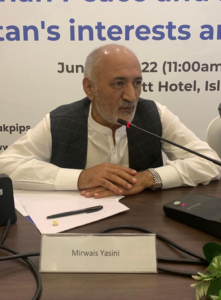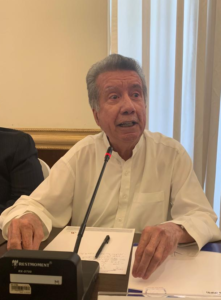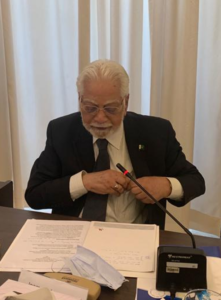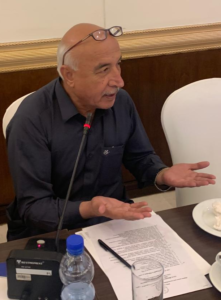PIPS CONSULTATION-4 ON AFGHAN PEACE & RECONCILIATION
Pak Institute for Peace Studies (PIPS) held fourth expert consultation on June 9, 2022, titled “Supporting the Afghan peace process: Pakistan’s position, interests, and policy options” in Islamabad. The main themes of the consultation were “the TTP’s indefinite ceasefire and the role of the Taliban” and “can the Taliban deliver on governance, security, and intra-Afghan reconciliation?” The event was the fourth of a series of quarterly consultations on Afghan peace and reconciliation PIPS has been organising since July 2021. Prominent experts, political leaders, former diplomats, retired army and police officials, academics, civil society representatives and media persons from Islamabad, Khyber Pakhtunkhwa, Balochistan and Afghanistan participated.
Participants noted that Pakistan needs to be “assertive” and should negotiate with outlawed Tehreek-e-Taliban Pakistan (TTP) from the “position of strength.” Most participants were not only critical of the demand of proscribed TTP about reversal of ex-FATA’s merger with Khyber Pakhtunkhwa (KP), but they also viewed that Pakistan should only talk to the group on the condition of surrendering and quitting violence. While there were divergent views about the outcome of Pakistan’s ongoing talks with the banned group with the majority being pessimistic about Pakistan’s success, questions were also raised about the composition of the Jirga that held these talks; they stressed the role of Parliament in that regard. Moreover, the majority of speakers also pointed that the expectation of Pakistan from the Afghan Taliban to use their influence on the TTP is not aligned with the security dynamics of the Af-Pak region.
However, former Defence Secretary Lt Gen (retd) Naeem Khalid Lodhi, while opening the debate, said that the option of Jirga to negotiate with the militant group could work because it had the support of the government as well as the military establishment and Afghan Taliban were mediators of these talks. He held, “There are chances of some breakthrough.” He also rejected the notion that the TTP and the Afghan Taliban were two sides of the same coin.
National Party president and former Balochistan chief minister Dr Abdul Malik Baloch called for adopting the policy of co-existence and urged that Pakistan would have to revisit its internal and external policies to attain peace in Balochistan and the entire country. He said, “We need to make the parliament powerful to debate and decide on matters (of security).”
Former corps commander and inspector general (IG) of Frontier Corps Lt Gen (retd) Tariq Khan was not in favour of talks with the banned group. “If we have to talk to them, we should only negotiate on the terms of surrender,” he said. Referring to the condition by the TTP leadership of the reversal of FATA merger, he questioned how a militant group can demand to govern a certain territory of Pakistan?
Former National Coordinator of the National Counter Terrorism Authority (NACTA) Ihsan Ghani was not hopeful that Pakistan would be successful in signing a peace accord with the group. “Even if they succeed in having an agreement with TTP, any such agreement would be an eyewash and short-lived.”
Senator Anwaar-ul-Haq Kakar noted that there must be a uniform policy to end violence in the country. He said that some practical “mode of reconciliation is still missing in our policy.”
 Ex-ambassador Aziz Ahmad Khan said that there appears to be no chances at the moment that the Taliban would form a broad-based government in Afghanistan and offer other stakeholders to share power with them. Hence, he recommended Pakistan to deal with the Afghan Taliban pragmatically.
Ex-ambassador Aziz Ahmad Khan said that there appears to be no chances at the moment that the Taliban would form a broad-based government in Afghanistan and offer other stakeholders to share power with them. Hence, he recommended Pakistan to deal with the Afghan Taliban pragmatically.
 Former first deputy speaker of the Lower House of the Afghan Parliament Mirwais Yasini sought Pakistan’s support to help them attain peace in their country. “I don’t see any viable administration in Kabul [in near future],” he said. He also noted that sectors like education and health have collapsed in Afghanistan. According to him if this situation continues it will definitely leave adverse spill over effects on Pakistan, so Pakistani leadership and ulema must step up their engagement and interact with Taliban administration.
Former first deputy speaker of the Lower House of the Afghan Parliament Mirwais Yasini sought Pakistan’s support to help them attain peace in their country. “I don’t see any viable administration in Kabul [in near future],” he said. He also noted that sectors like education and health have collapsed in Afghanistan. According to him if this situation continues it will definitely leave adverse spill over effects on Pakistan, so Pakistani leadership and ulema must step up their engagement and interact with Taliban administration.
 Mohsin Dawar, member of the National Assembly of Pakistan while criticising the nature of jirga asserted that anyone who is in command just thinks that what he can bring on his profile while being in the position of command of any jirga. He also added that Haqqanis need TTP in Afghanistan so they will never pressurise the group to end militancy.
Mohsin Dawar, member of the National Assembly of Pakistan while criticising the nature of jirga asserted that anyone who is in command just thinks that what he can bring on his profile while being in the position of command of any jirga. He also added that Haqqanis need TTP in Afghanistan so they will never pressurise the group to end militancy.
Abdullah Khan, expert on militancy and regional security when asked about the success of negotiations with the outlawed TTP, completely condemned the legitimacy of such negotiations. He viewed that by sitting at a table with the defeated faction, Pakistani leadership is just refuting its efforts like operation Zarb-e-Azb.
 Maulana Abdul Qadir Luni, head of JUI-Nazaryati Balochistan questioned the validity of Jirga sent by Pakistani administration. He highlighted that from Spin Boldak to Kabul, the Taliban have lost trust in Pakistan and until this trust is restored, nothing will be successful, so Pakistan should identify and engage people whom the Taliban trust.
Maulana Abdul Qadir Luni, head of JUI-Nazaryati Balochistan questioned the validity of Jirga sent by Pakistani administration. He highlighted that from Spin Boldak to Kabul, the Taliban have lost trust in Pakistan and until this trust is restored, nothing will be successful, so Pakistan should identify and engage people whom the Taliban trust.
Zafar Nawaz Jaspal, Professor at the School of Politics and International Relations, Quaid-i-Azam University questioned that why would a state delegate its power. He was of the view that the peace committees made every now and then are just a recipe for disaster. He also added that we are creating friction within the society by diluting the boundaries between state institutions. Moreover, he strongly condemned talks with the TTP by suggesting that militants should either be put through trial or completely eliminated.
Former National Security Advisor of Pakistan, Lt. General (Retd) Nasser Janjua stressed that two decades long war in Afghanistan has given birth to many misunderstandings; almost all countries have stakes in Afghanistan and, so, there are many narratives. He noted that with much to handle during our deteriorating political and economic situation, talks with TTP are definitely driven by good intention. However, he agreed that in order to make these talks a success some points must be seriously considered. First, in order to resolve TTP issue, there needs to be realisation that the TTP is a defeated phenomenon. There was a time when people were vehemently joining TTP, because it offered ideology, passion, and money. Now the appeal of the TTP phenomenon has diminished significantly, so we do not really need to run after a defeated phenomenon and even involve the Afghan Taliban into it. Secondly, we need to learn how to seek the closure of a conflict. What we are doing is instead estranging the population of our neighbouring Afghanistan.
Azaz Syed, journalist and security expert, highlighted that Pakistan’s policy towards immigrants has constantly been ignored. Though we claim to have moved towards a well-designed visa policy for Afghans, the reality is just the opposite. He suggested to look at immediate facilitation measures for Afghans. Due to our stringent immigration policy, a child that is born in Pakistan is neither given immigrant status, nor citizenship of Pakistan. This child then goes on to become part of our black market. He added that the core problem is that our political parties are not serious about our Afghan policy, because they think it will not be made in the parliament or foreign office, but in Rawalpindi.
 Afrasiab Khattak, political analyst and expert on Afghan affairs pointed out that the Talibanization is creating enmity between Afghanistan and Pakistan. He advised Pakistan to focus its energies towards nation building and making Afghanis their friends.
Afrasiab Khattak, political analyst and expert on Afghan affairs pointed out that the Talibanization is creating enmity between Afghanistan and Pakistan. He advised Pakistan to focus its energies towards nation building and making Afghanis their friends.
Muzhgan Feraji, journalist and educationist from Afghanistan, voiced that there is no peace in Afghanistan and the Taliban today are no different than the Taliban who took control in the 1990s. She also asserted that when states like Pakistan want to negotiate with the Taliban, they should remember that the Taliban are not representatives of the people of Afghanistan.
 Former foreign secretary Inam-ul-Haq viewed that Pakistan should recognise Afghanistan as an independent and separate country and deal with it in the same manner. He refuted the idea that Pakistan should give away a part of its territory to TTP through any peace deal. He raised an important question: Is there a difference between today’s Taliban and the Taliban before? Pertaining to this question he was of the opinion there even are two groups within Taliban themselves; modernised ones and those who are strictly aligned to their ideological orientation. This difference can be seen in their contrasting approach towards women and their rights.
Former foreign secretary Inam-ul-Haq viewed that Pakistan should recognise Afghanistan as an independent and separate country and deal with it in the same manner. He refuted the idea that Pakistan should give away a part of its territory to TTP through any peace deal. He raised an important question: Is there a difference between today’s Taliban and the Taliban before? Pertaining to this question he was of the opinion there even are two groups within Taliban themselves; modernised ones and those who are strictly aligned to their ideological orientation. This difference can be seen in their contrasting approach towards women and their rights.
In the beginning, Director PIPS Muhammad Amir Rana in his welcome remarks provided the rationale and objective behind conducting such consultations and underlined the need to discuss emerging socio-economic and political trends in Afghanistan along with the ongoing talks with the outlawed TTP.




